MGT602 - Business Decision Analysis: Decision Making Styles Report
VerifiedAdded on 2023/06/03
|7
|1483
|242
Report
AI Summary
This report delves into the analysis of business decision-making styles and personality, focusing on the individual's decision preferences and how they influence the decision-making process. The report explores the application of various decision-making tools and the reflection on personal decision-making styles, contrasting them with other styles to determine the levels of rationality and intuition utilized. The author's personality is examined through the MBTI, revealing the "VIRTUOSO" type and its implications. The report also includes a diary review, identifying autocratic and consultative decision-making styles, and discusses feedback received on decision preferences. Recommendations are provided for improvement, focusing on adapting to different decision-making styles and enhancing interpersonal relationships. References to relevant literature are also included.
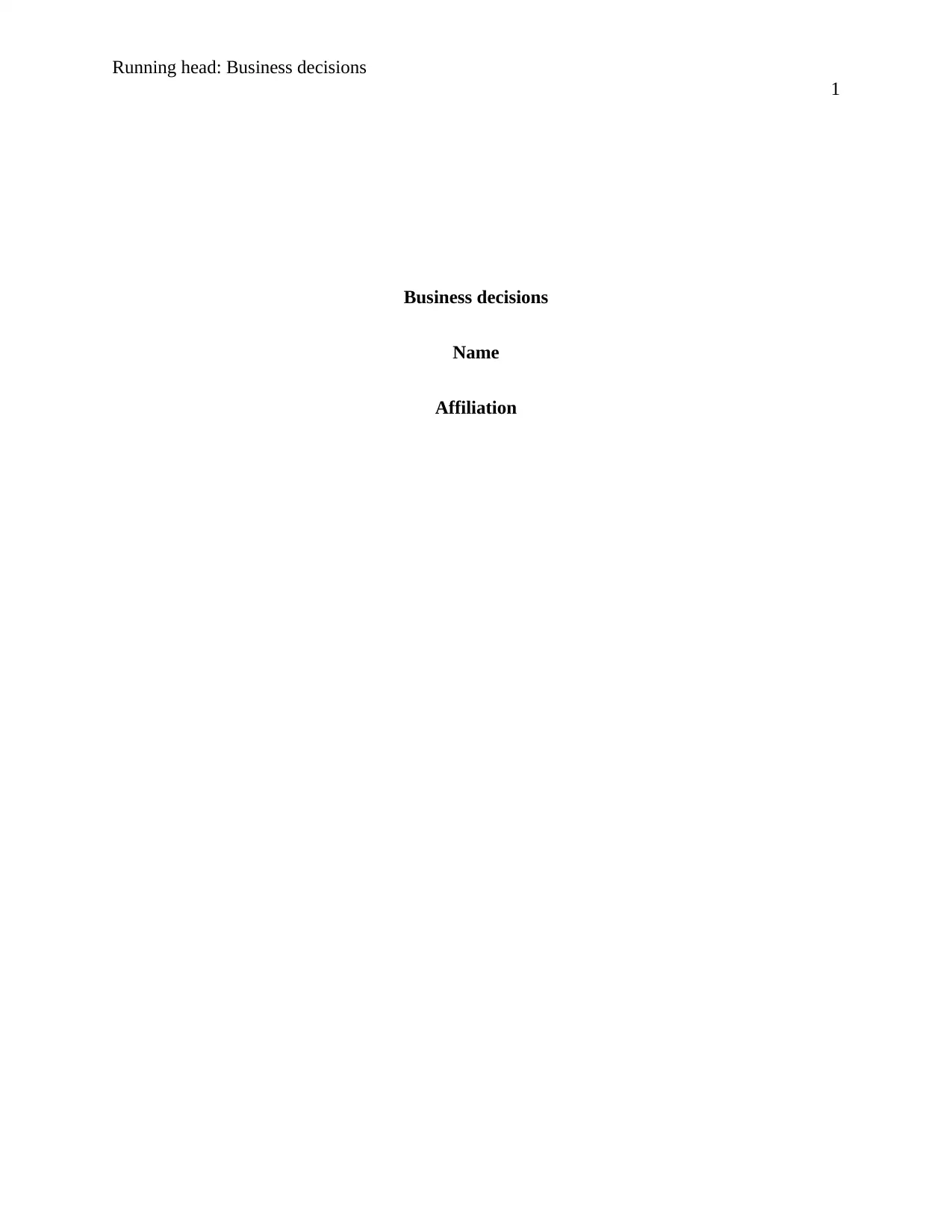
Running head: Business decisions
1
Business decisions
Name
Affiliation
1
Business decisions
Name
Affiliation
Paraphrase This Document
Need a fresh take? Get an instant paraphrase of this document with our AI Paraphraser
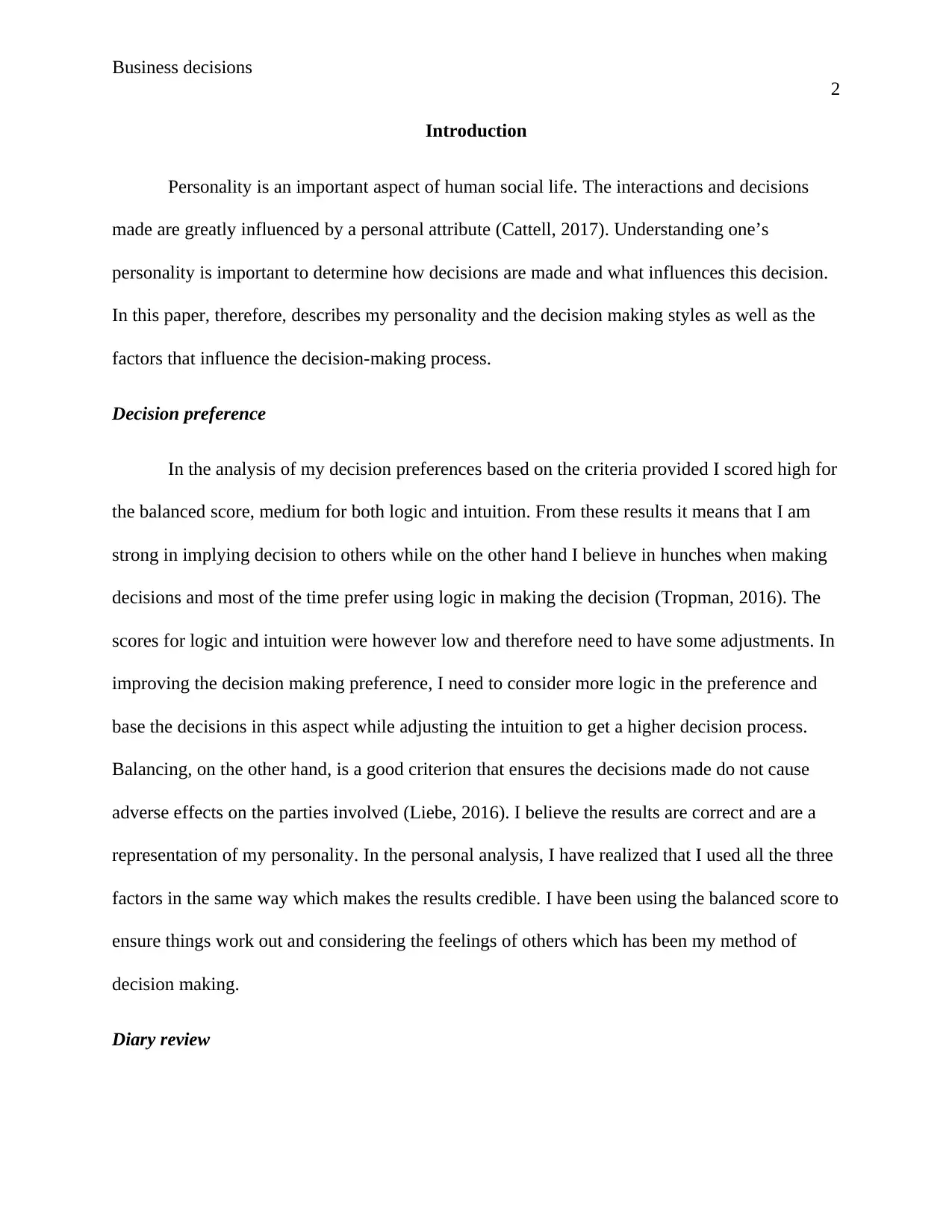
Business decisions
2
Introduction
Personality is an important aspect of human social life. The interactions and decisions
made are greatly influenced by a personal attribute (Cattell, 2017). Understanding one’s
personality is important to determine how decisions are made and what influences this decision.
In this paper, therefore, describes my personality and the decision making styles as well as the
factors that influence the decision-making process.
Decision preference
In the analysis of my decision preferences based on the criteria provided I scored high for
the balanced score, medium for both logic and intuition. From these results it means that I am
strong in implying decision to others while on the other hand I believe in hunches when making
decisions and most of the time prefer using logic in making the decision (Tropman, 2016). The
scores for logic and intuition were however low and therefore need to have some adjustments. In
improving the decision making preference, I need to consider more logic in the preference and
base the decisions in this aspect while adjusting the intuition to get a higher decision process.
Balancing, on the other hand, is a good criterion that ensures the decisions made do not cause
adverse effects on the parties involved (Liebe, 2016). I believe the results are correct and are a
representation of my personality. In the personal analysis, I have realized that I used all the three
factors in the same way which makes the results credible. I have been using the balanced score to
ensure things work out and considering the feelings of others which has been my method of
decision making.
Diary review
2
Introduction
Personality is an important aspect of human social life. The interactions and decisions
made are greatly influenced by a personal attribute (Cattell, 2017). Understanding one’s
personality is important to determine how decisions are made and what influences this decision.
In this paper, therefore, describes my personality and the decision making styles as well as the
factors that influence the decision-making process.
Decision preference
In the analysis of my decision preferences based on the criteria provided I scored high for
the balanced score, medium for both logic and intuition. From these results it means that I am
strong in implying decision to others while on the other hand I believe in hunches when making
decisions and most of the time prefer using logic in making the decision (Tropman, 2016). The
scores for logic and intuition were however low and therefore need to have some adjustments. In
improving the decision making preference, I need to consider more logic in the preference and
base the decisions in this aspect while adjusting the intuition to get a higher decision process.
Balancing, on the other hand, is a good criterion that ensures the decisions made do not cause
adverse effects on the parties involved (Liebe, 2016). I believe the results are correct and are a
representation of my personality. In the personal analysis, I have realized that I used all the three
factors in the same way which makes the results credible. I have been using the balanced score to
ensure things work out and considering the feelings of others which has been my method of
decision making.
Diary review
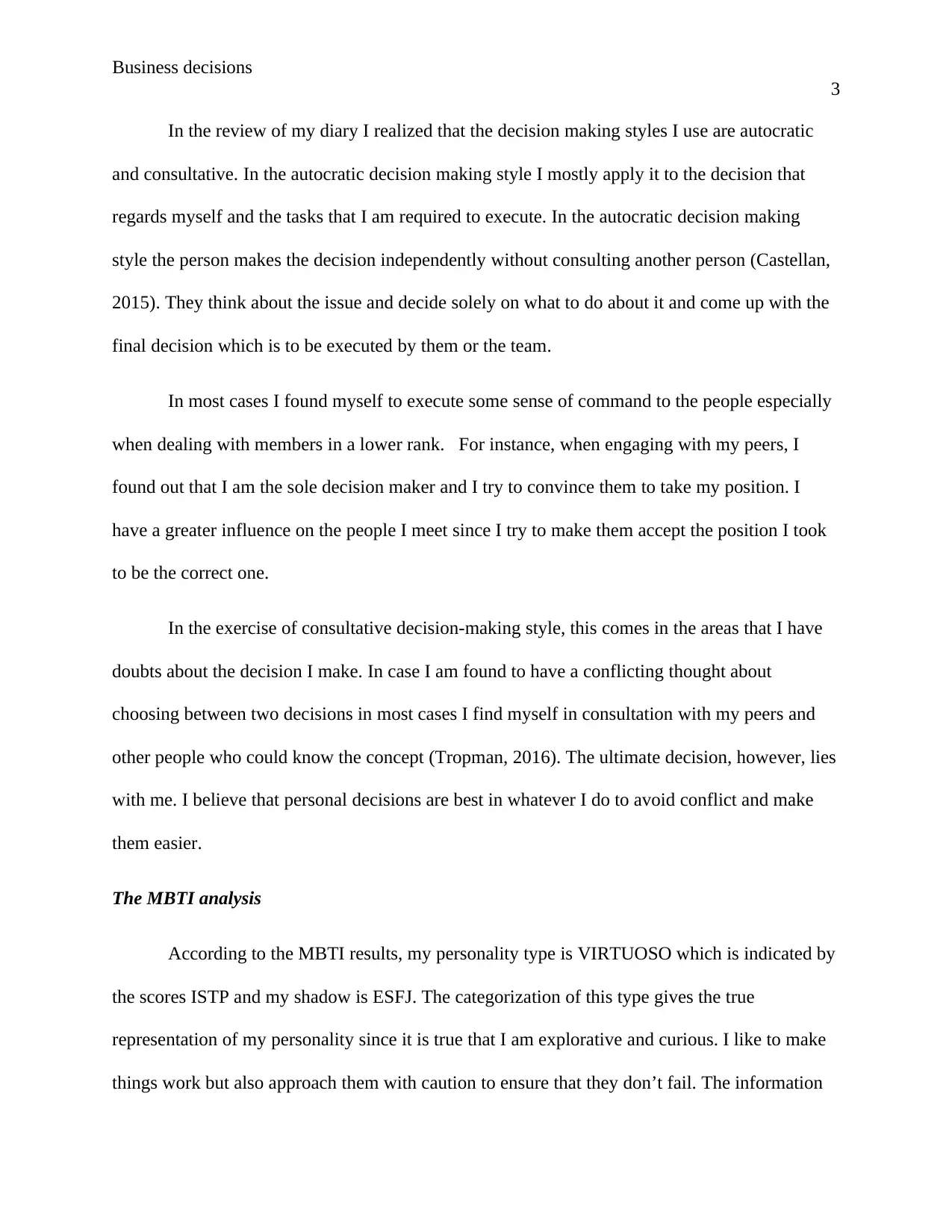
Business decisions
3
In the review of my diary I realized that the decision making styles I use are autocratic
and consultative. In the autocratic decision making style I mostly apply it to the decision that
regards myself and the tasks that I am required to execute. In the autocratic decision making
style the person makes the decision independently without consulting another person (Castellan,
2015). They think about the issue and decide solely on what to do about it and come up with the
final decision which is to be executed by them or the team.
In most cases I found myself to execute some sense of command to the people especially
when dealing with members in a lower rank. For instance, when engaging with my peers, I
found out that I am the sole decision maker and I try to convince them to take my position. I
have a greater influence on the people I meet since I try to make them accept the position I took
to be the correct one.
In the exercise of consultative decision-making style, this comes in the areas that I have
doubts about the decision I make. In case I am found to have a conflicting thought about
choosing between two decisions in most cases I find myself in consultation with my peers and
other people who could know the concept (Tropman, 2016). The ultimate decision, however, lies
with me. I believe that personal decisions are best in whatever I do to avoid conflict and make
them easier.
The MBTI analysis
According to the MBTI results, my personality type is VIRTUOSO which is indicated by
the scores ISTP and my shadow is ESFJ. The categorization of this type gives the true
representation of my personality since it is true that I am explorative and curious. I like to make
things work but also approach them with caution to ensure that they don’t fail. The information
3
In the review of my diary I realized that the decision making styles I use are autocratic
and consultative. In the autocratic decision making style I mostly apply it to the decision that
regards myself and the tasks that I am required to execute. In the autocratic decision making
style the person makes the decision independently without consulting another person (Castellan,
2015). They think about the issue and decide solely on what to do about it and come up with the
final decision which is to be executed by them or the team.
In most cases I found myself to execute some sense of command to the people especially
when dealing with members in a lower rank. For instance, when engaging with my peers, I
found out that I am the sole decision maker and I try to convince them to take my position. I
have a greater influence on the people I meet since I try to make them accept the position I took
to be the correct one.
In the exercise of consultative decision-making style, this comes in the areas that I have
doubts about the decision I make. In case I am found to have a conflicting thought about
choosing between two decisions in most cases I find myself in consultation with my peers and
other people who could know the concept (Tropman, 2016). The ultimate decision, however, lies
with me. I believe that personal decisions are best in whatever I do to avoid conflict and make
them easier.
The MBTI analysis
According to the MBTI results, my personality type is VIRTUOSO which is indicated by
the scores ISTP and my shadow is ESFJ. The categorization of this type gives the true
representation of my personality since it is true that I am explorative and curious. I like to make
things work but also approach them with caution to ensure that they don’t fail. The information
⊘ This is a preview!⊘
Do you want full access?
Subscribe today to unlock all pages.

Trusted by 1+ million students worldwide
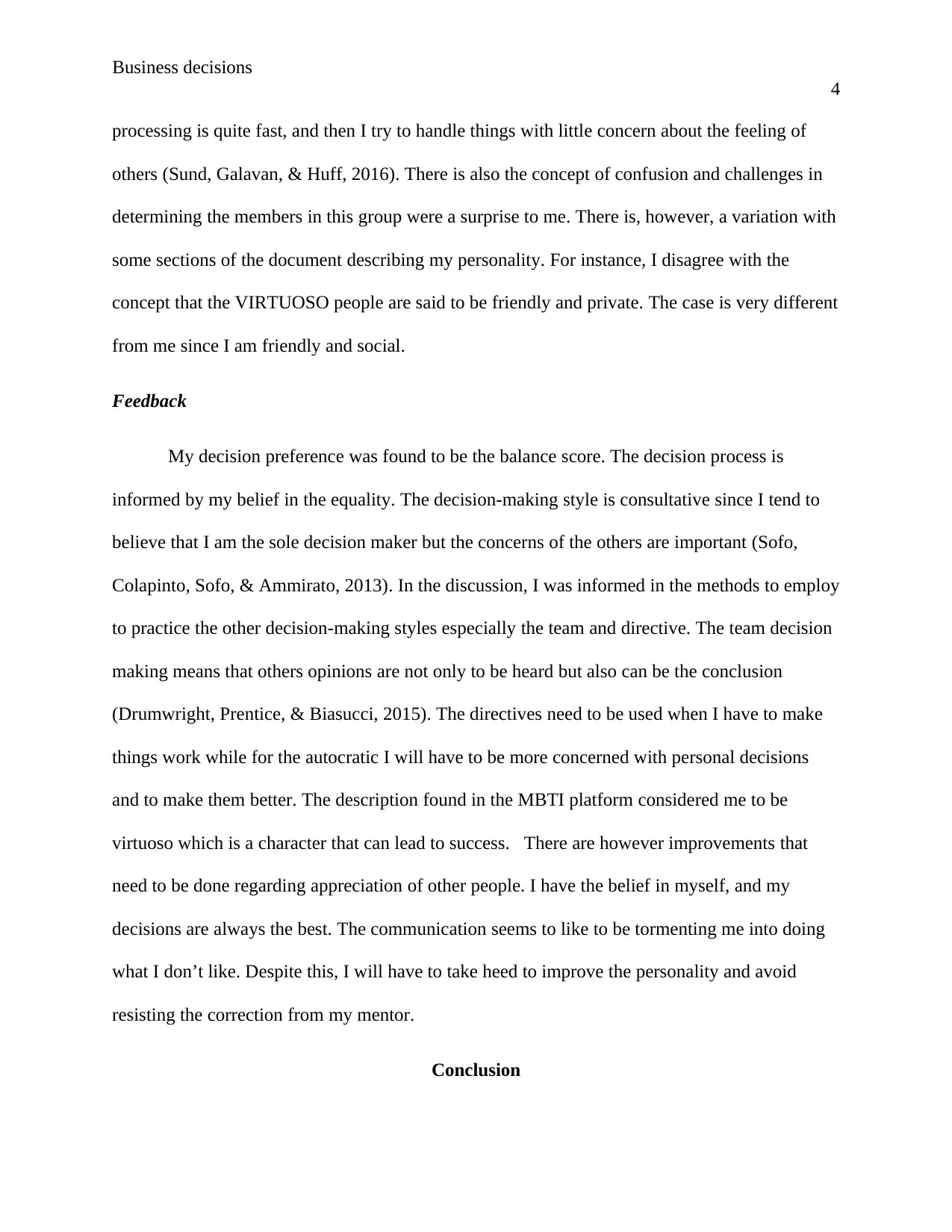
Business decisions
4
processing is quite fast, and then I try to handle things with little concern about the feeling of
others (Sund, Galavan, & Huff, 2016). There is also the concept of confusion and challenges in
determining the members in this group were a surprise to me. There is, however, a variation with
some sections of the document describing my personality. For instance, I disagree with the
concept that the VIRTUOSO people are said to be friendly and private. The case is very different
from me since I am friendly and social.
Feedback
My decision preference was found to be the balance score. The decision process is
informed by my belief in the equality. The decision-making style is consultative since I tend to
believe that I am the sole decision maker but the concerns of the others are important (Sofo,
Colapinto, Sofo, & Ammirato, 2013). In the discussion, I was informed in the methods to employ
to practice the other decision-making styles especially the team and directive. The team decision
making means that others opinions are not only to be heard but also can be the conclusion
(Drumwright, Prentice, & Biasucci, 2015). The directives need to be used when I have to make
things work while for the autocratic I will have to be more concerned with personal decisions
and to make them better. The description found in the MBTI platform considered me to be
virtuoso which is a character that can lead to success. There are however improvements that
need to be done regarding appreciation of other people. I have the belief in myself, and my
decisions are always the best. The communication seems to like to be tormenting me into doing
what I don’t like. Despite this, I will have to take heed to improve the personality and avoid
resisting the correction from my mentor.
Conclusion
4
processing is quite fast, and then I try to handle things with little concern about the feeling of
others (Sund, Galavan, & Huff, 2016). There is also the concept of confusion and challenges in
determining the members in this group were a surprise to me. There is, however, a variation with
some sections of the document describing my personality. For instance, I disagree with the
concept that the VIRTUOSO people are said to be friendly and private. The case is very different
from me since I am friendly and social.
Feedback
My decision preference was found to be the balance score. The decision process is
informed by my belief in the equality. The decision-making style is consultative since I tend to
believe that I am the sole decision maker but the concerns of the others are important (Sofo,
Colapinto, Sofo, & Ammirato, 2013). In the discussion, I was informed in the methods to employ
to practice the other decision-making styles especially the team and directive. The team decision
making means that others opinions are not only to be heard but also can be the conclusion
(Drumwright, Prentice, & Biasucci, 2015). The directives need to be used when I have to make
things work while for the autocratic I will have to be more concerned with personal decisions
and to make them better. The description found in the MBTI platform considered me to be
virtuoso which is a character that can lead to success. There are however improvements that
need to be done regarding appreciation of other people. I have the belief in myself, and my
decisions are always the best. The communication seems to like to be tormenting me into doing
what I don’t like. Despite this, I will have to take heed to improve the personality and avoid
resisting the correction from my mentor.
Conclusion
Paraphrase This Document
Need a fresh take? Get an instant paraphrase of this document with our AI Paraphraser
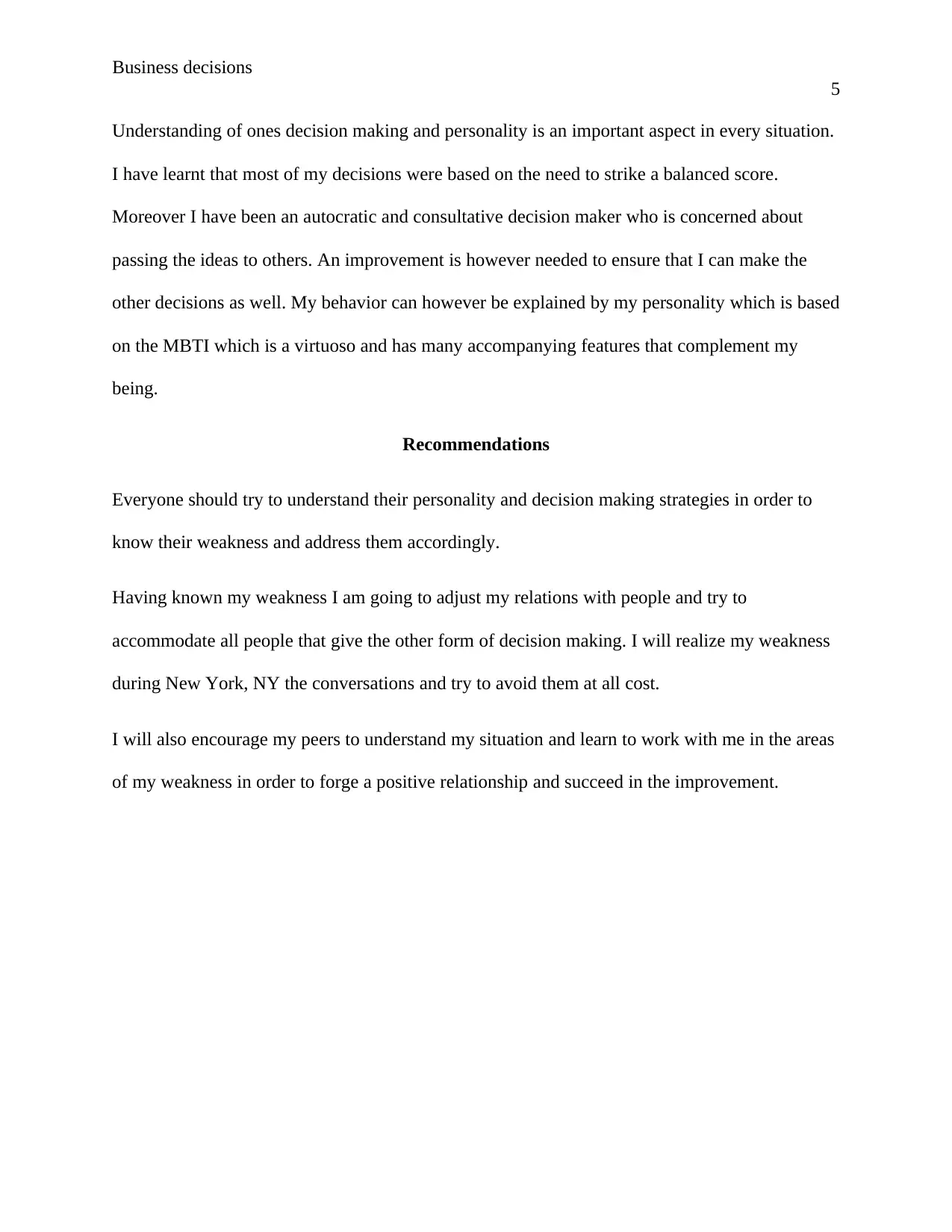
Business decisions
5
Understanding of ones decision making and personality is an important aspect in every situation.
I have learnt that most of my decisions were based on the need to strike a balanced score.
Moreover I have been an autocratic and consultative decision maker who is concerned about
passing the ideas to others. An improvement is however needed to ensure that I can make the
other decisions as well. My behavior can however be explained by my personality which is based
on the MBTI which is a virtuoso and has many accompanying features that complement my
being.
Recommendations
Everyone should try to understand their personality and decision making strategies in order to
know their weakness and address them accordingly.
Having known my weakness I am going to adjust my relations with people and try to
accommodate all people that give the other form of decision making. I will realize my weakness
during New York, NY the conversations and try to avoid them at all cost.
I will also encourage my peers to understand my situation and learn to work with me in the areas
of my weakness in order to forge a positive relationship and succeed in the improvement.
5
Understanding of ones decision making and personality is an important aspect in every situation.
I have learnt that most of my decisions were based on the need to strike a balanced score.
Moreover I have been an autocratic and consultative decision maker who is concerned about
passing the ideas to others. An improvement is however needed to ensure that I can make the
other decisions as well. My behavior can however be explained by my personality which is based
on the MBTI which is a virtuoso and has many accompanying features that complement my
being.
Recommendations
Everyone should try to understand their personality and decision making strategies in order to
know their weakness and address them accordingly.
Having known my weakness I am going to adjust my relations with people and try to
accommodate all people that give the other form of decision making. I will realize my weakness
during New York, NY the conversations and try to avoid them at all cost.
I will also encourage my peers to understand my situation and learn to work with me in the areas
of my weakness in order to forge a positive relationship and succeed in the improvement.
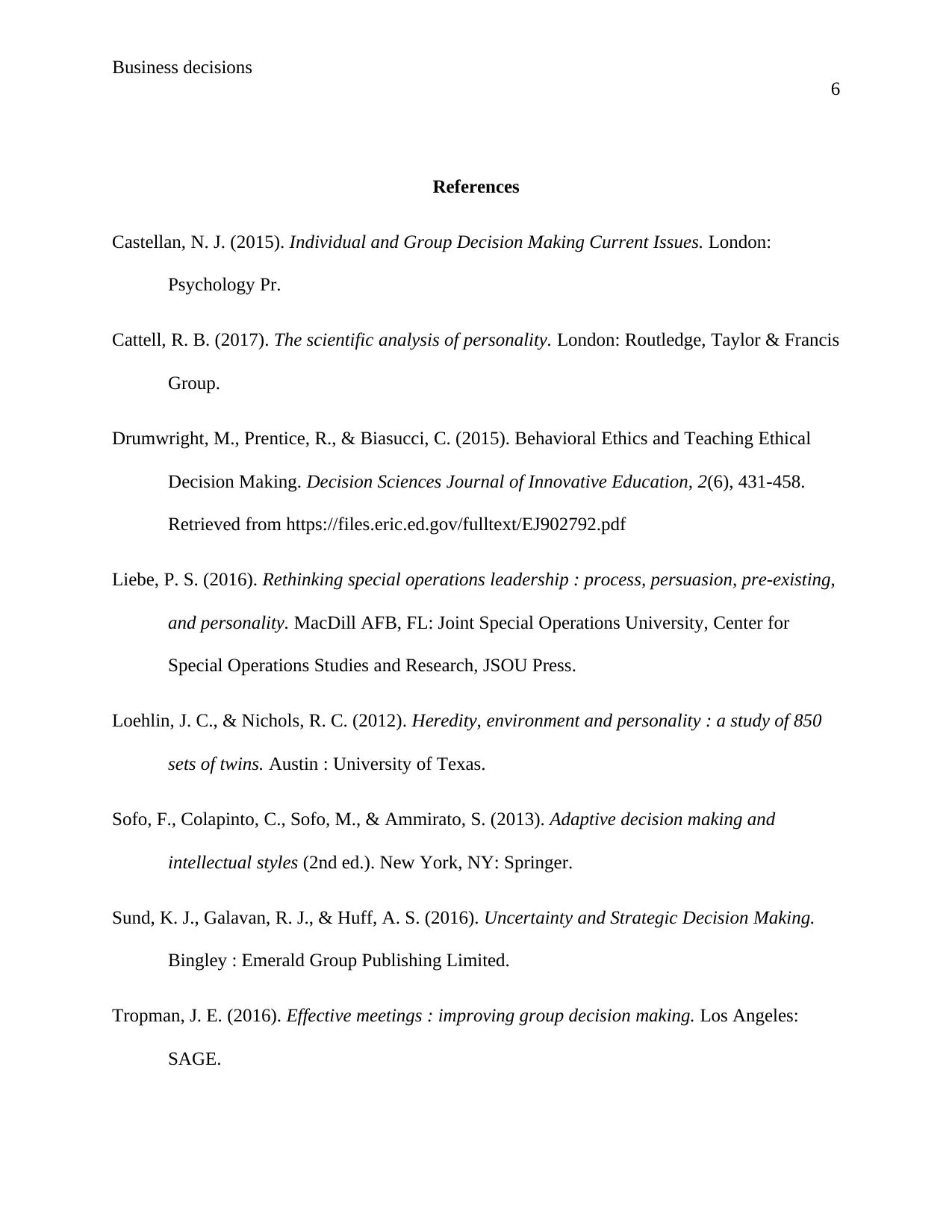
Business decisions
6
References
Castellan, N. J. (2015). Individual and Group Decision Making Current Issues. London:
Psychology Pr.
Cattell, R. B. (2017). The scientific analysis of personality. London: Routledge, Taylor & Francis
Group.
Drumwright, M., Prentice, R., & Biasucci, C. (2015). Behavioral Ethics and Teaching Ethical
Decision Making. Decision Sciences Journal of Innovative Education, 2(6), 431-458.
Retrieved from https://files.eric.ed.gov/fulltext/EJ902792.pdf
Liebe, P. S. (2016). Rethinking special operations leadership : process, persuasion, pre-existing,
and personality. MacDill AFB, FL: Joint Special Operations University, Center for
Special Operations Studies and Research, JSOU Press.
Loehlin, J. C., & Nichols, R. C. (2012). Heredity, environment and personality : a study of 850
sets of twins. Austin : University of Texas.
Sofo, F., Colapinto, C., Sofo, M., & Ammirato, S. (2013). Adaptive decision making and
intellectual styles (2nd ed.). New York, NY: Springer.
Sund, K. J., Galavan, R. J., & Huff, A. S. (2016). Uncertainty and Strategic Decision Making.
Bingley : Emerald Group Publishing Limited.
Tropman, J. E. (2016). Effective meetings : improving group decision making. Los Angeles:
SAGE.
6
References
Castellan, N. J. (2015). Individual and Group Decision Making Current Issues. London:
Psychology Pr.
Cattell, R. B. (2017). The scientific analysis of personality. London: Routledge, Taylor & Francis
Group.
Drumwright, M., Prentice, R., & Biasucci, C. (2015). Behavioral Ethics and Teaching Ethical
Decision Making. Decision Sciences Journal of Innovative Education, 2(6), 431-458.
Retrieved from https://files.eric.ed.gov/fulltext/EJ902792.pdf
Liebe, P. S. (2016). Rethinking special operations leadership : process, persuasion, pre-existing,
and personality. MacDill AFB, FL: Joint Special Operations University, Center for
Special Operations Studies and Research, JSOU Press.
Loehlin, J. C., & Nichols, R. C. (2012). Heredity, environment and personality : a study of 850
sets of twins. Austin : University of Texas.
Sofo, F., Colapinto, C., Sofo, M., & Ammirato, S. (2013). Adaptive decision making and
intellectual styles (2nd ed.). New York, NY: Springer.
Sund, K. J., Galavan, R. J., & Huff, A. S. (2016). Uncertainty and Strategic Decision Making.
Bingley : Emerald Group Publishing Limited.
Tropman, J. E. (2016). Effective meetings : improving group decision making. Los Angeles:
SAGE.
⊘ This is a preview!⊘
Do you want full access?
Subscribe today to unlock all pages.

Trusted by 1+ million students worldwide

Business decisions
7
7
1 out of 7
Related Documents
Your All-in-One AI-Powered Toolkit for Academic Success.
+13062052269
info@desklib.com
Available 24*7 on WhatsApp / Email
![[object Object]](/_next/static/media/star-bottom.7253800d.svg)
Unlock your academic potential
Copyright © 2020–2026 A2Z Services. All Rights Reserved. Developed and managed by ZUCOL.



